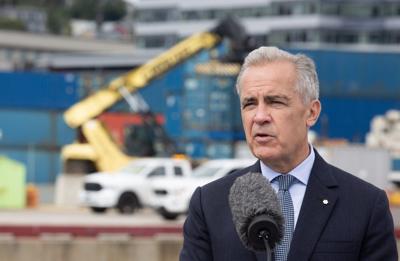OTTAWA — Prime Minister Mark Carney declined to endorse Canada’s greenhouse gas targets under the Paris Agreement on Thursday, stating his government is focused on “results, not objectives” as he advocated for a “grand bargain” that could see regulations changed to clear the way for a new export pipeline from Alberta’s oilsands — so long as a major project to reduce the industry’s emissions gets built.Â
Carney made the comments in Edmonton, where he unveiled the first list of projects that his government wants to fast-track for construction to bolster and “transform” the Canadian economy that has been battered by a trade war with the United States. The prime minister said his government also wants to speed up work on other projects, with decisions to come before the winter, including possibly about fast-tracking the major “Pathways” carbon capture proposal envisioned by a conglomerate of fossil fuel companies in Alberta.Â
Echoing Alberta Premier Danielle Smith’s call for a “grand bargain” to build more oil and gas infrastructure, Carney said his government supports extracting and exporting “lower carbon conventional energy” in what he deemed a “Pathways Plus” proposal. The carbon capture project would reduce emissions that cause climate change from the process of extracting oil and gas from the ground, which Carney said is a “necessary condition to unlock” new pipelines for export, although no private company is pitching a major oil pipeline development right now.
“That creates the opportunity for the ‘plus.’ The ‘plus’ is a potential pipeline to a variety of potential markets,” Carney said.
He also suggested his government could use its new law, the controversial Bill C-5 that was enacted in June, to “make adjustments” to existing regulations like the oil tanker traffic ban off the north coast of British Columbia and the Impact Assessment Act. Both laws passed when his predecessor Justin Trudeau was prime minister, and have been frequent targets of criticism from opposition Conservatives who blame such regulations for stalling fossil fuel and private sector development.Â
The overall announcement to fast-track projects was applauded by several business and policy groups, while environmental organizations like Environmental Defence and the David Suzuki Foundation raised questions about the willingness to expand fossil fuel infrastructure while the government works on a new climate “competitiveness” strategy to promote low-emission growth and change major climate policies like the industrial carbon pricing and clean fuel regulations.
When asked twice at the news conference whether he is still committed to Canada’s emissions reduction targets for 2030 and 2035, Carney — speaking in French — would only say that his government is focused on “results, not objectives.” A spokesperson from his office refused to clarify the government’s stance, referring the Star to the Environment Department.
In an emailed statement, Keean Nembhard, a spokesperson for Environment Minister Julie Dabrusin, said Thursday that Canada is committed to hitting “net zero” by emissions but did not repeat Ottawa’s previously longstanding pledge to hit the two earlier emissions targets for 2030 and 2035. Â
Nembhard said that, “taking into account the evolving global and economic context,” the government will update its current emissions reduction plan “as we strive towards our 2030 and 2035 targets.”
The responses from the prime minister and Dabrusin Thursday contrast with what Carney’s campaign told the Star during the Liberal leadership race this year: that he was “committed to not only meet but exceed Canada’s current climate targets.”Â
Shortly after he took office in March, Carney dropped Ottawa’s requirement for a minimum consumer carbon price in all provinces and territories. Last week, when unveiling a package of supports for tariff-stricken businesses in the automobile, steel and other sectors, Carney — amidst the trade war with the United States and tariffs against the Canadian auto sector — delayed the onset of long-planned sales mandates for zero-emission vehicles and placed the policy under a 60-day review.Â
The Star also reported in June that the Carney Liberals are willing to weaken or cancel the Trudeau government’s planned emissions cap for the oil and gas sector if the Pathways carbon capture project gets built in Alberta, since the development could achieve similar emissions reductions.Â
Caroline Brouillette, executive director of Climate Action Network Canada, said the Carney government is sending confusing signals about its commitment to Canada’s obligations under the Paris Agreement. Under that international deal, the most recent in a series of failed global efforts to slash greenhouse gas pollution over the past three decades, the federal government has pledged to slash national greenhouse gas emissions to 40 per cent below 2005 levels by 2030, and 45 per cent below 2005 levels by 2035.Â
Brouillette argued that Carney appears willing to keep promoting fossil fuels at a time when renewable energy is needed to address the climate crisis and capture opportunities for economic growth.Â
“What Prime Minister Carney is telling us is that he wants, in some ways, to remain tethered to President Trump’s ambition of a fossil-fuel based economy for North America,” she said.Â
Error! Sorry, there was an error processing your request.
There was a problem with the recaptcha. Please try again.
You may unsubscribe at any time. By signing up, you agree to our and . This site is protected by reCAPTCHA and the Google and apply.
Want more of the latest from us? Sign up for more at our newsletter page.


























To join the conversation set a first and last name in your user profile.
Sign in or register for free to join the Conversation